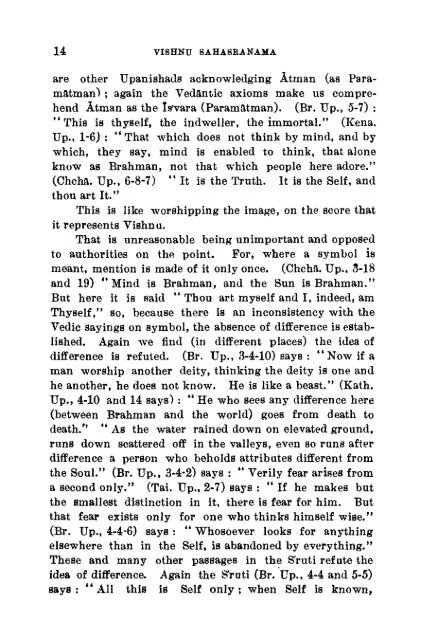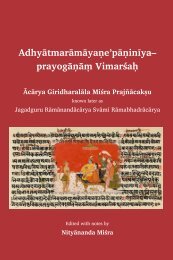Vishnu.Sahasranama.with.the.Bhasya.of.Sankaracharya_text
Vishnu.Sahasranama.with.the.Bhasya.of.Sankaracharya_text
Vishnu.Sahasranama.with.the.Bhasya.of.Sankaracharya_text
You also want an ePaper? Increase the reach of your titles
YUMPU automatically turns print PDFs into web optimized ePapers that Google loves.
14 VISHNU SAHASRANAMA<br />
are o<strong>the</strong>r Upanishads acknowledging Atman (as Paramatman)<br />
; again <strong>the</strong> Vedantic axioms make us comprehend<br />
Atman as <strong>the</strong> Is'vara (Paramatman). (Br. Up., 5-7) :<br />
"This is thyself, <strong>the</strong> indweller, <strong>the</strong> immortal." (Kena.<br />
Up., 1-6) : " That which does not think by mind, and by<br />
which, <strong>the</strong>y say, mind is enabled to think, that alone<br />
know as Brahman, not that which people here adore."<br />
(Chcha. Up., 6-8-7) "It is <strong>the</strong> Truth. It is <strong>the</strong> Self, and<br />
thou art It."<br />
This is like worshipping <strong>the</strong> image, on <strong>the</strong> score that<br />
it represents <strong>Vishnu</strong>.<br />
That is unreasonable being unimportant and opposed<br />
to authorities on <strong>the</strong> point. For, where a symbol is<br />
meant, mention is made <strong>of</strong> it only once. (Chcha. Up., 3-18<br />
and 19) "Mind is Brahman, and <strong>the</strong> Sun is Brahman."<br />
But here it is said " Thou art myself and I, indeed, am<br />
Thyself," so, because <strong>the</strong>re is an inconsistency <strong>with</strong> <strong>the</strong><br />
Vedic sayings on symbol, <strong>the</strong> absence <strong>of</strong> difference is estab-<br />
lished. Again we find (in different places) <strong>the</strong> idea <strong>of</strong><br />
difference is refuted. (Br. Up., 3-4-10) says : "Now if a<br />
man worship ano<strong>the</strong>r deity, thinking <strong>the</strong> deity is one and<br />
he ano<strong>the</strong>r, he does not know. He is like a beast." (Kath.<br />
Up., 4-10 and 14 says) : " He who sees any difference here<br />
(between Brahman and <strong>the</strong> world) goes from death to<br />
death/' " As <strong>the</strong> water rained down on elevated ground,<br />
runs down scattered <strong>of</strong>f in <strong>the</strong> valleys, even so runs after<br />
difference a person who beholds attributes different from<br />
<strong>the</strong> Soul." (Br. Up., 3-4-2) says : " Verily fear arises from<br />
a second only." (Tai. Up., 2-7) says : " If he makes but<br />
<strong>the</strong> smallest distinction in it, <strong>the</strong>re is fear for him. But<br />
that fear exists only for one who thinks himself wise."<br />
(Br. Up., 4-4-6) says : " Whosoever looks for anything<br />
elsewhere than in <strong>the</strong> Self, is abandoned by everything."<br />
These and many o<strong>the</strong>r passages in <strong>the</strong> S'ruti refute <strong>the</strong><br />
idea <strong>of</strong> difference. Again <strong>the</strong> S'ruti (Br. Up., 4-4 and 5-5)<br />
says : " All this is Self only ; when Self is known,



